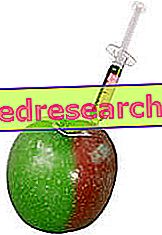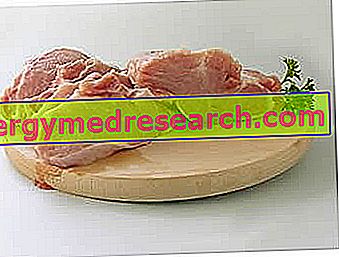Definition
The term "hoarseness" refers to a lowering / alteration of the voice: the subject suffering from hoarseness is struggling to speak in a natural tone. The disorder causes an alteration in the quality of the voice (aphonia), which is weak and roca, an expression - generally - of inflammation of the larynx.
Causes
The obstacle to speaking, typical of patients suffering from hoarseness, can be a lighted sign of numerous diseases, such as: allergies, aortic aneurysm, abscesses, bronchitis, esophagitis, cystic fibrosis, respiratory and vocal cord infections, ingestion of chemical substances corrosive, overwork of the voice (singing), hypothyroidism, laryngitis, Hashimoto's disease, thyroid nodules, smoking, chronic cough, esophageal or thyroid cancer.
Hoarseness is not always a symptom of a serious illness: a simple sore throat or the abuse of the voice in singing, for example, could be the cause; in this case, the item returns to normal within a few days.
Symptoms
We speak of acute hoarseness when the lowering of the voice - albeit intense - regresses within a few days of its appearance, and of chronic hoarseness when the alteration of the vocal tone lasts over time. In the presence of hoarseness, the affected patient is not able to speak with a natural tone of voice: the alteration of the vocal cords, in fact, hinders the passage of air, producing a hoarse, low and weak sound.
- Complications: the neurogenic form is a dangerous variant of hoarseness, which consists in paralysis of the vocal cords (→ paralysis of the vagus nerve)
The information on hoarseness - Drugs for the treatment of hoarseness is not intended to replace the direct relationship between health professional and patient. Always consult your physician and / or specialist before taking Hoarseness - Drugs for the treatment of hoarseness.
drugs
It is rather complex to draw up a list of drugs for the treatment of hoarseness, since we are not talking about a disease in itself, but a symptom that is common to many diseases. According to this, one understands how the choice of a drug or a treatment rather than another is influenced by the cause that arises there.
In most cases, the rest of the voice improves the hoarseness: in similar situations, it is recommended not to over-strain the voice and to speak the strictly necessary, so as not to exacerbate the disorder. Patients with hoarseness should also avoid whispering, since the vocal cords are still excited.
Below are the drugs and therapeutic strategies best suited to treat the various forms of hoarseness:
- Hoarseness-related laryngitis: laryngitis can be caused by viral / bacterial insults, gastroesophageal reflux disease, alcohol abuse, smoking and toxic substances (which weigh down the walls of the throat). In this case, hoarseness should be treated on the basis of the cause that triggers inflammation of the larynx: the most widely used drugs in therapy are antibiotics, antifungals, corticosteroids and painkillers. For further information and dosage: read the article on drugs for the treatment of laryngitis.
- Hoarseness dependent on a cold stroke: in these cases, the administration of drugs for the treatment of the discomfort is not recommended, since the physical rest and of the voice are sufficient to fully restore the complete functionality of the vocal cords.
- Hoarseness dependent on bacterial infections: hoarseness, in this case, is a symptom secondary to a bacterial insult, which must be treated with a specific antibiotic treatment. The most suitable drug should be prescribed by your doctor based on the pathogen that triggered the infection. The removal of the bacterium will also involve the complete recovery of the vocal capacity, therefore the healing of hoarseness.
- Gastroesophageal reflux-dependent hoarseness: sometimes, reflux diseases corrode the mucosa of the esophagus to the point of heavily affecting the functionality of the vocal cords, causing hoarseness. In this case, it is advisable to take drugs to treat gastroesophageal reflux disease.
- In the most severe cases, hoarseness depends on the presence of a real obstacle along the vocal channel: polyps and the presence of malignant cellular masses can in fact alter speech ability, creating hoarseness, circumscribed inflammation, redness and difficulty in speaking. In this case, it will be the duty of the physician to establish the most appropriate pharmacological and / or surgical treatment. See the article for the treatment of nasal polyps.
- Even hypothyroidism - as well as Hashimoto's disease - can create negative repercussions on the quality of the voice, and induce hoarseness and speech difficulties: in this case, it is recommended to follow a specific cure for the cure of the underlying disease. Read the article on drugs for the treatment of hypothyroidism and for the treatment of Hashimoto's disease.
For the same reason, among the many secondary symptoms, even esophageal and thyroid tumors can manifest themselves with hoarseness. (→ read the article on drugs for the treatment of thyroid cancer and esophagus).
- For the treatment of severe hoarseness, depending on the paralysis of the vocal cords, it is recommended to inject a suspension of Teflon ® (a heterologous material injected directly into the vocal cord), to bring the vocal cords closer and improve the quality of the voice, relieving hoarseness (treatment invasive).
In all forms of hoarseness it is strongly advised against smoking and drinking alcohol, as the contact of these substances with the mucous membrane of the throat and the vocal cords can aggravate the pre-existing problem and prolong the healing time from hoarseness.



